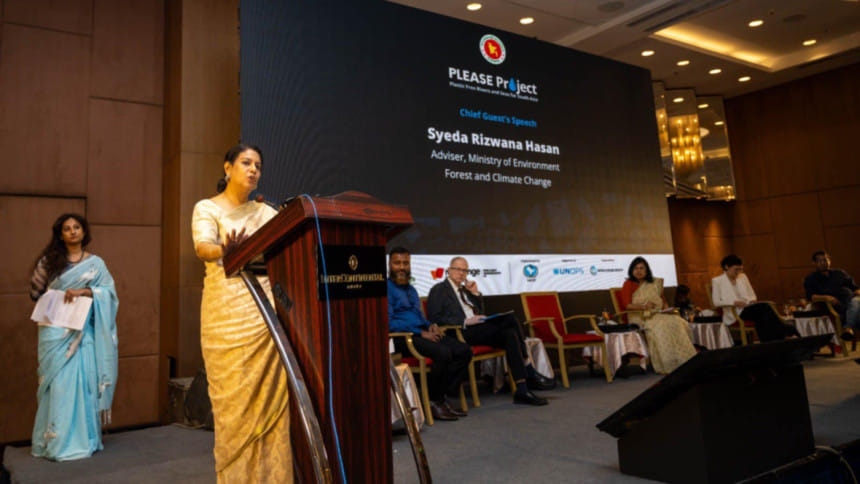We must pay attention to single-use plastic issue: Adviser Rizwana

Environment Adviser Syeda Rizwana Hasan has said that all types of single-use plastics cause physical and environmental harm and so people must pay attention to this issue.
The adviser came up with the remark at an event themed "Scaling Innovations and Best Practices in Plastic Waste Management" which showcased transformative innovations and community-driven solutions addressing plastic pollution across the country. The event was held yesterday.
She said, "Many people say that I only talk about polythene."
"But in reality, all types of single-use plastics are causing physical and environmental harm. We must pay attention to this issue. Our ancestors lived without plastic—so can we," she added.
In her keynote address, Syeda Rizwana Hasan, adviser to the Ministry of Environment, Forest and Climate Change, underscored the urgency of changing consumption habits.
She added, "There are now many alternatives to plastic. It's time we actively embrace those and reduce our reliance on harmful, disposable materials."
At the event, national and international stakeholders gathered today at the Intercontinental Dhaka for the National Knowledge Sharing Workshop of the Plastic Free Rivers and Seas for South Asia (PLEASE) Project.
Following her remarks, Dr Fahmida Khanom, additional secretary at the ministry, emphasised the role of innovation, citizen responsibility, and inter-agency coordination. She said, "This is our responsibility—not just as NGO officers or government staff, but as citizens—to reduce plastic waste and make our environment healthy."
She also raised a critical question for future action: "How can we work with local governments to replicate these pilots in other areas? What should be our next step? We must engage meaningfully with the implementing partners and local authorities to scale these efforts."
Gwyn Lewis, United Nations resident coordinator in Bangladesh, highlighted the human stories behind the numbers. "Jobs created, awareness raised, waste repurposed—but what resonates with me most is the human dimension," she said.
"Waste pickers are being recognised and fairly compensated, women are gaining new economic opportunities, and young people are stepping up with real solutions. This is more than just an environmental movement—it's a leap toward social and economic progress."
The PLEASE Project, a regional initiative of the South Asia Cooperative Environment Programme (SACEP) supported by the World Bank and UNOPS, is implemented in Bangladesh under the ministry's guidance. The project's local partners—Institute of Marine Sciences (IMS), University of Chittagong, Arannayk Foundation, and RedOrange Limited—shared their field-level innovations that are already making a difference.
As part of the programme, RedOrange Limited have already installed floating barriers in Kallyanpur canals of Dhaka, capturing over 65 metric tonnes of plastic waste to track pollution.

 For all latest news, follow The Daily Star's Google News channel.
For all latest news, follow The Daily Star's Google News channel. 



Comments